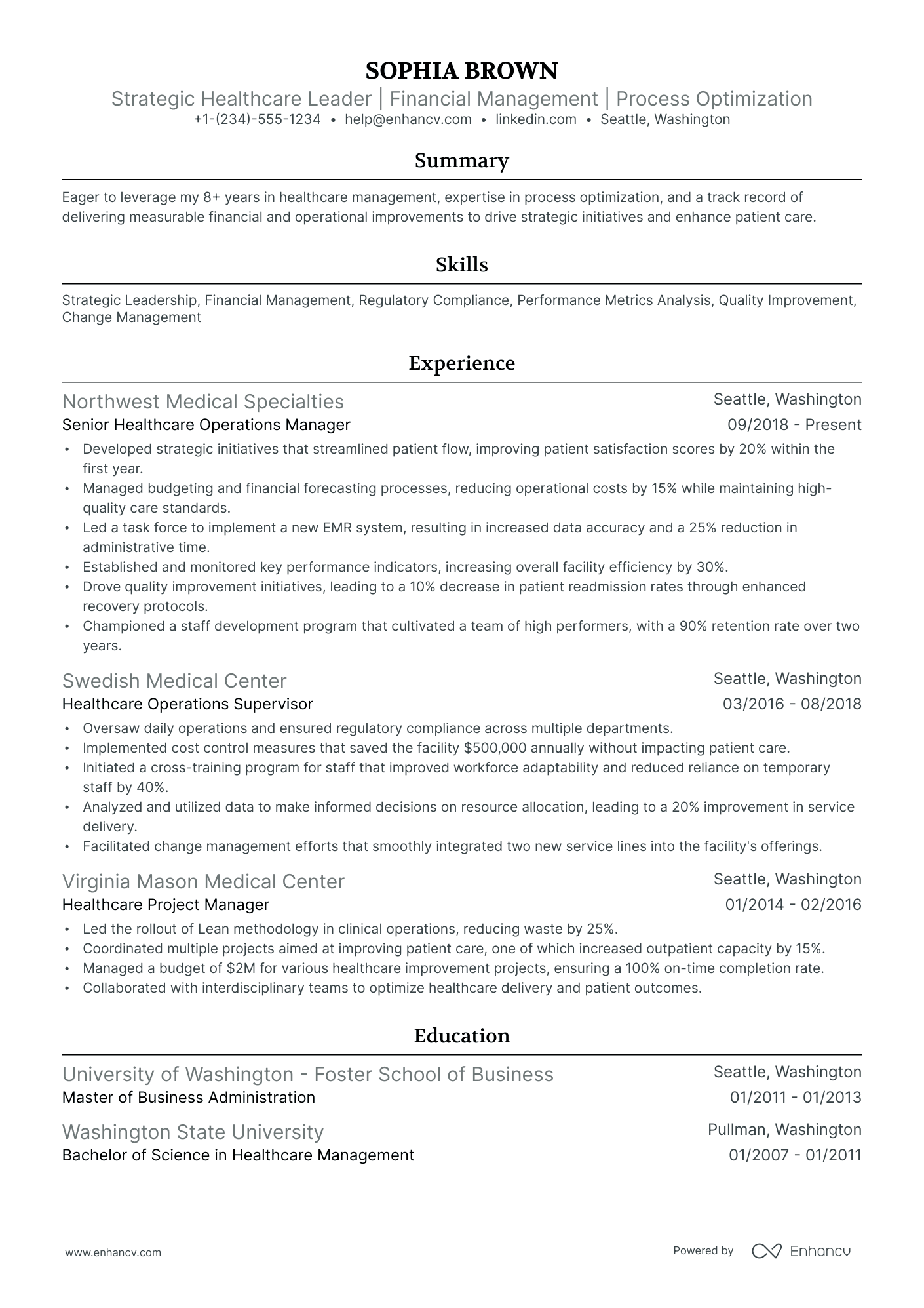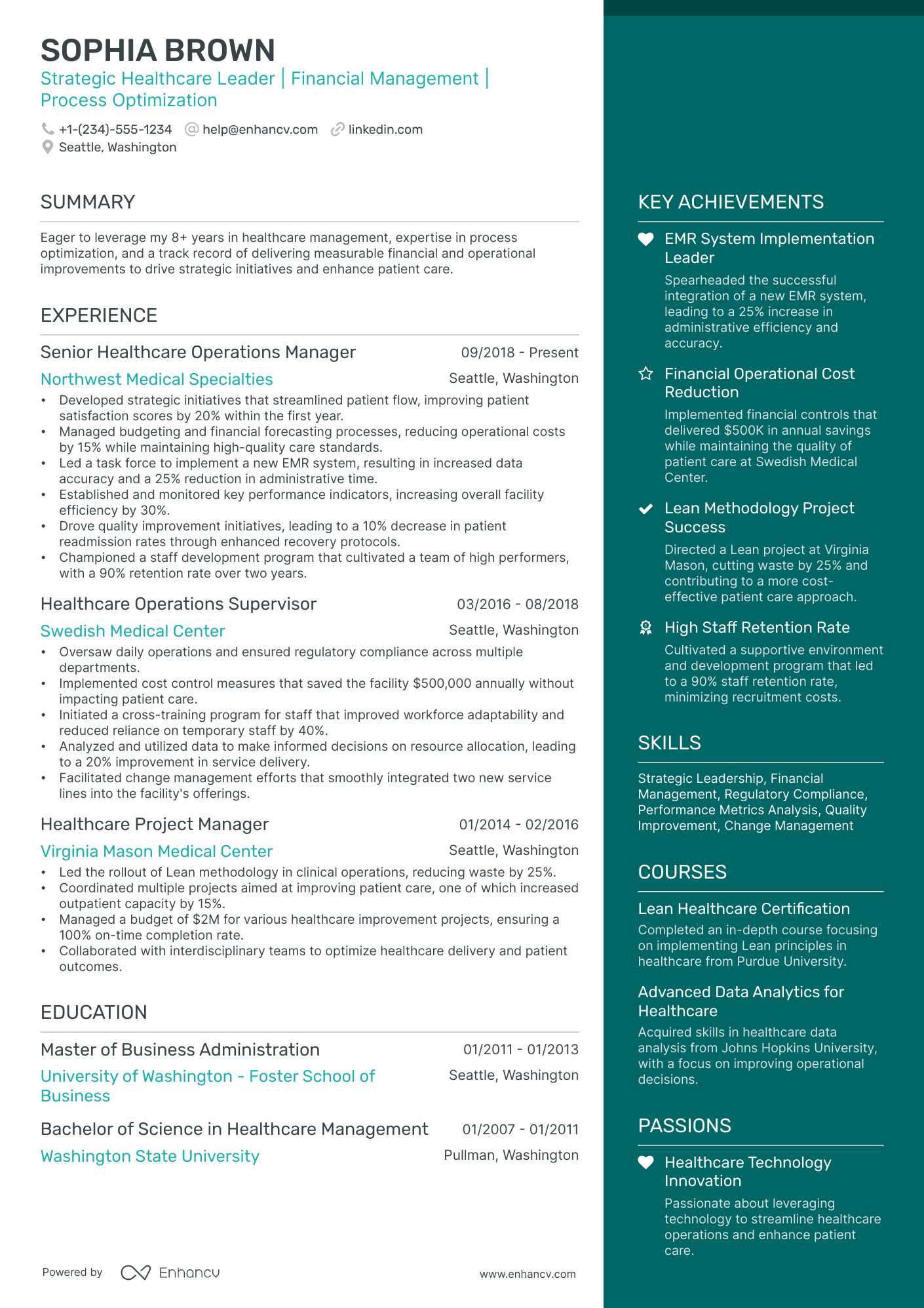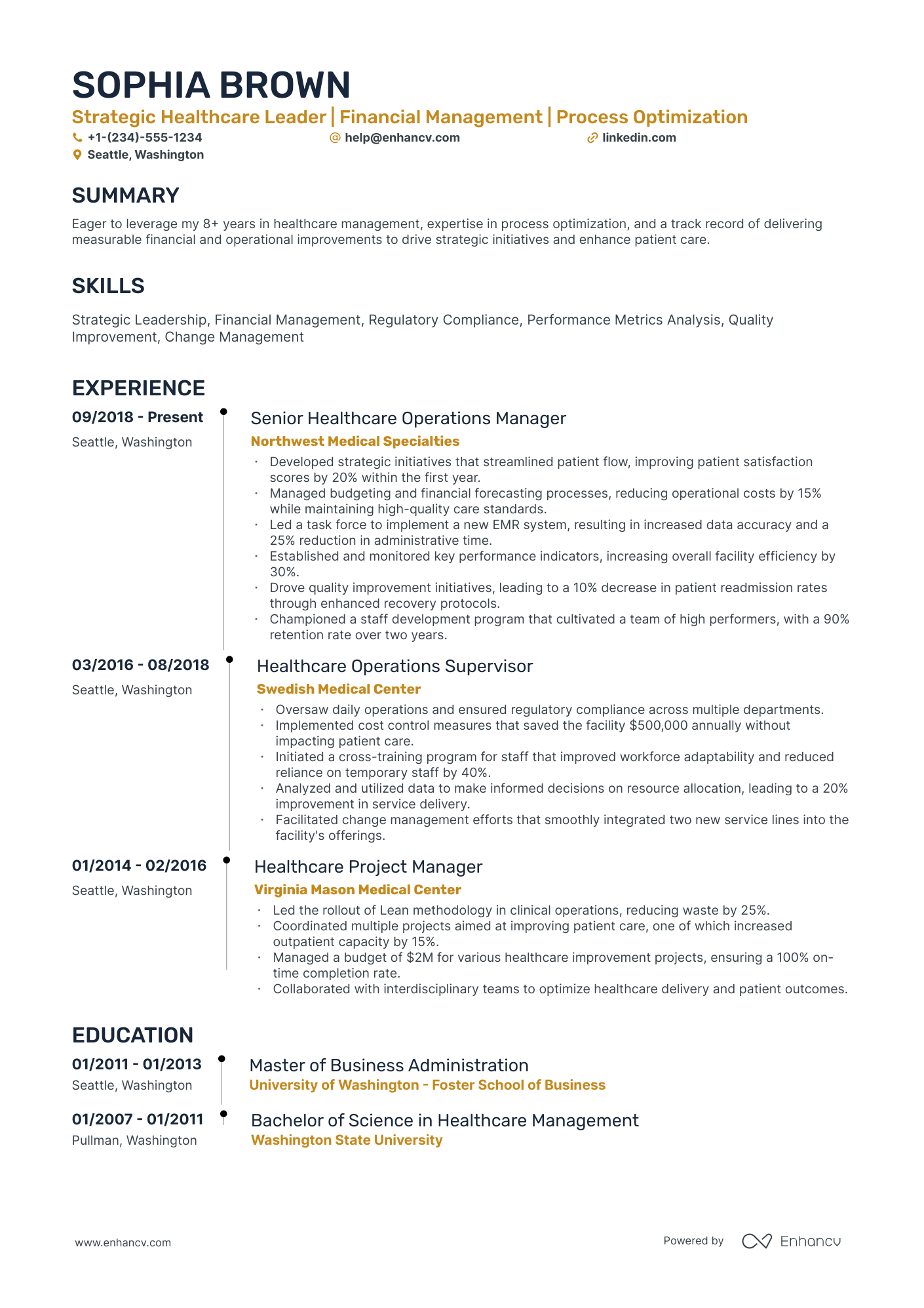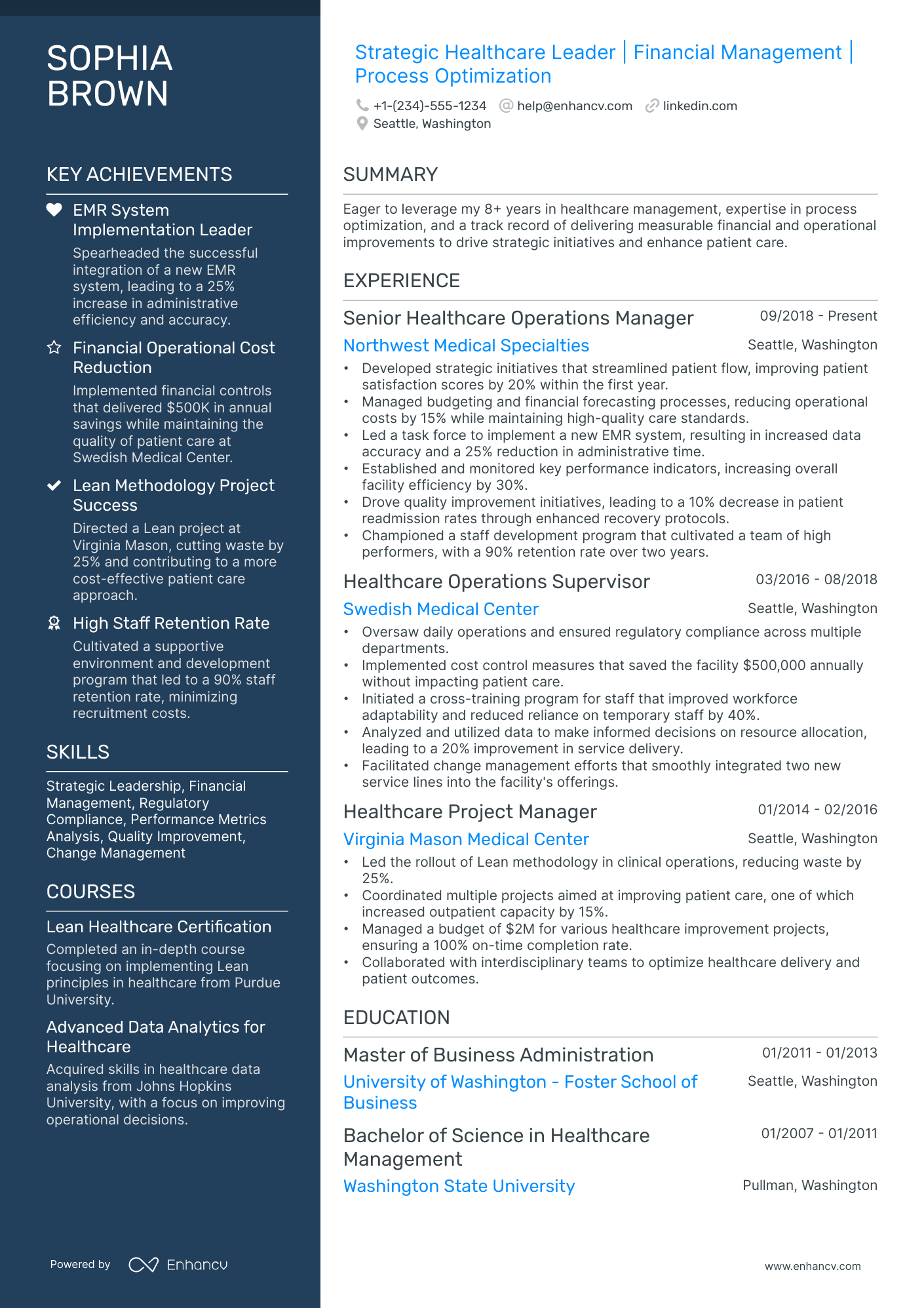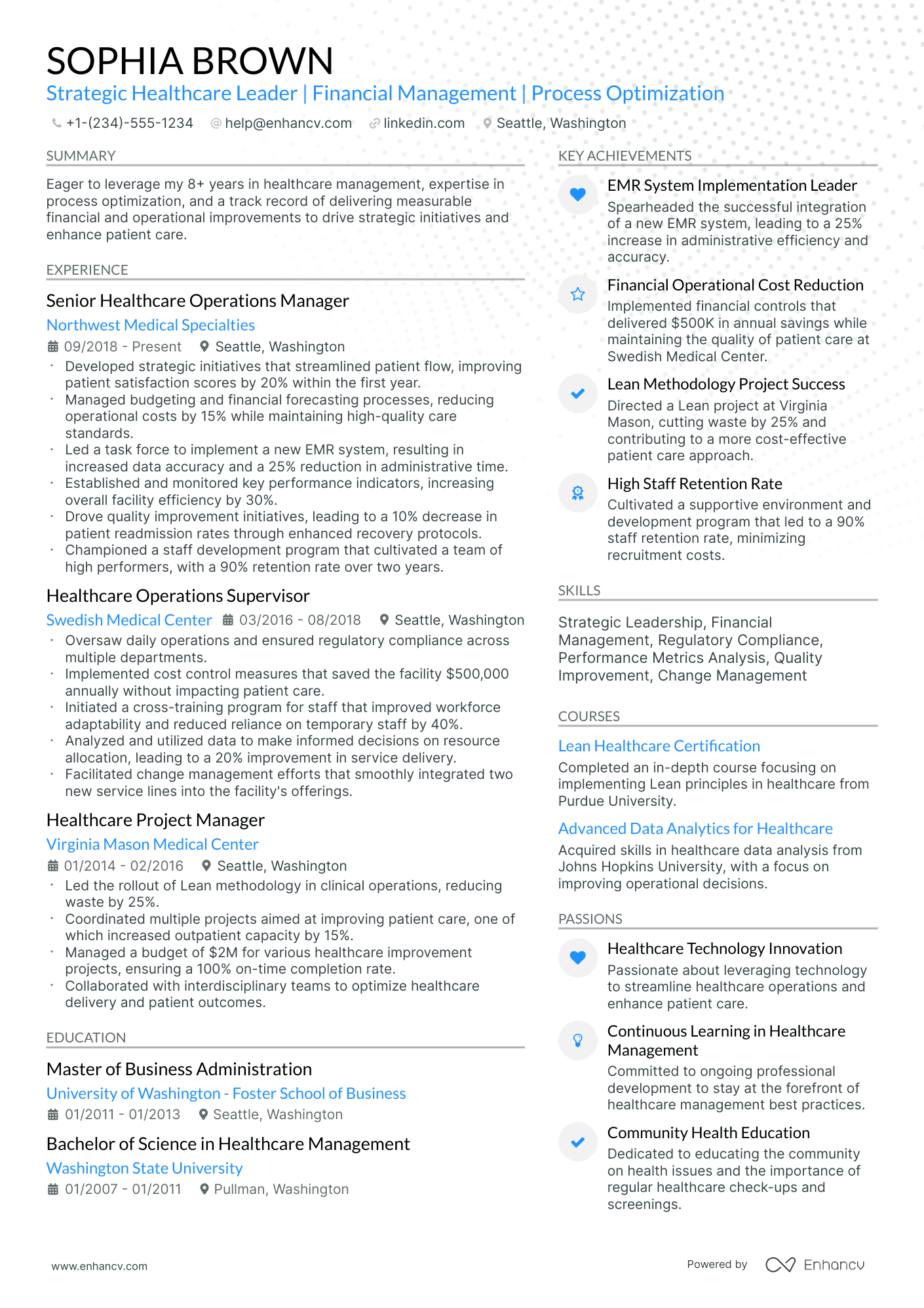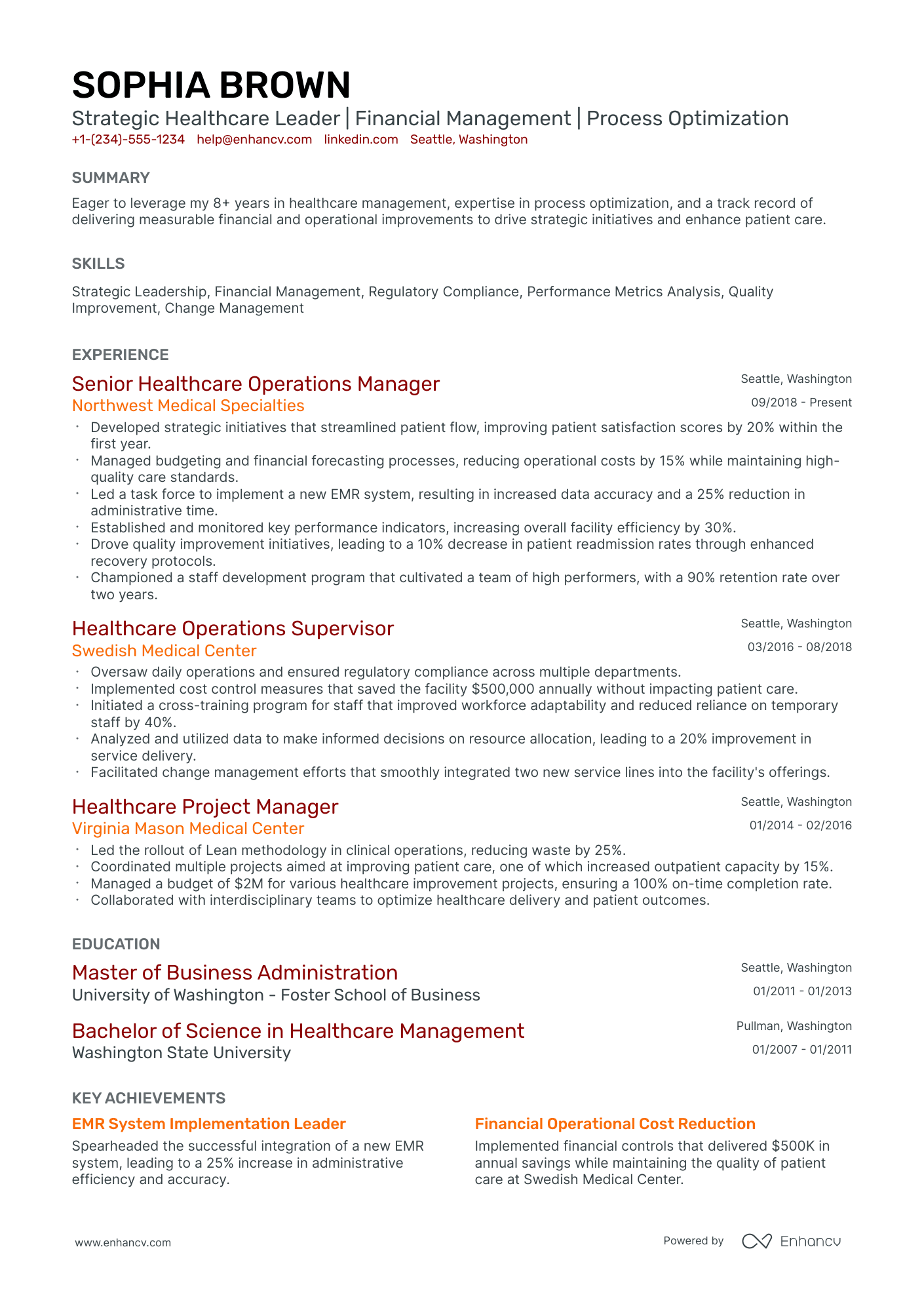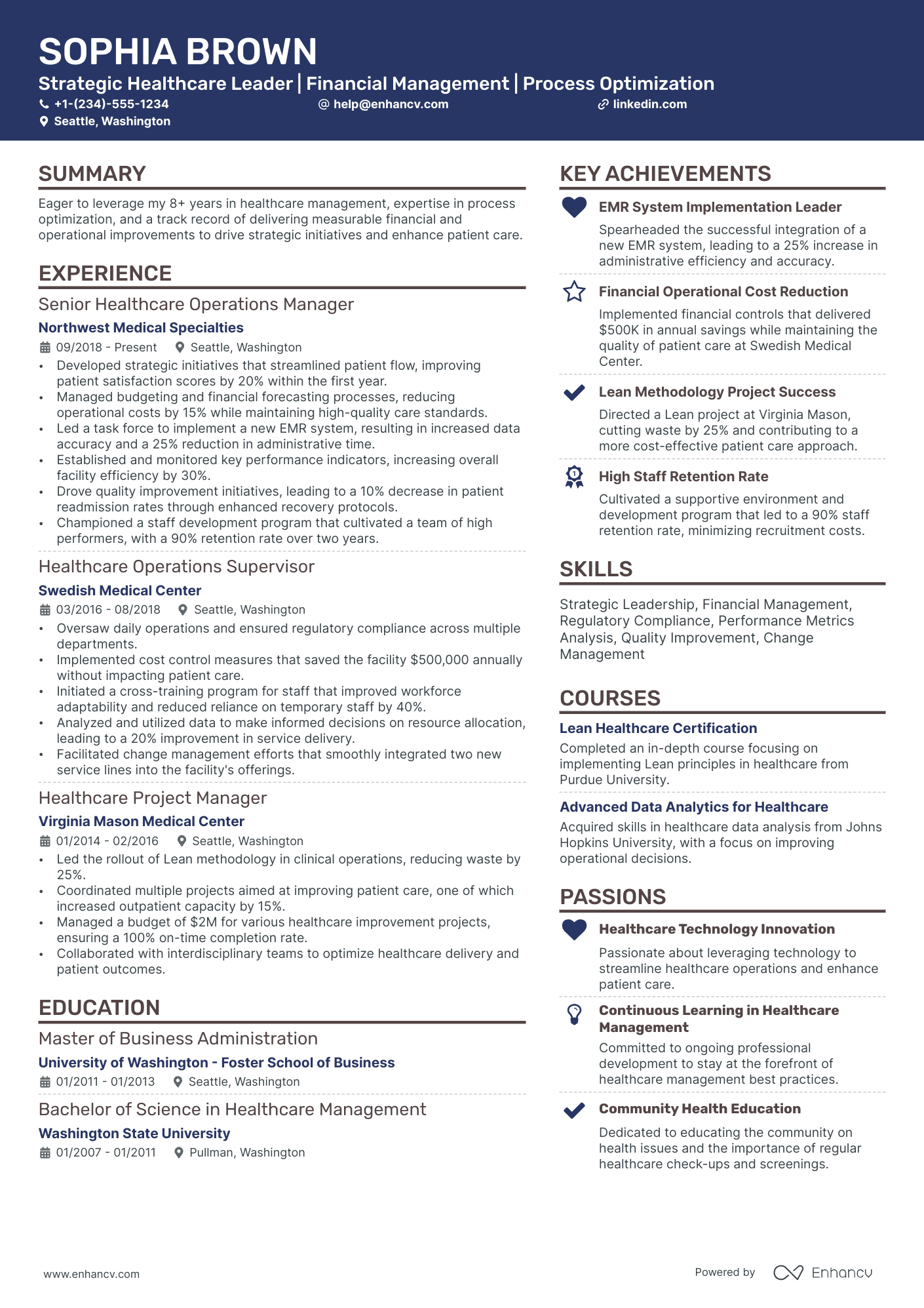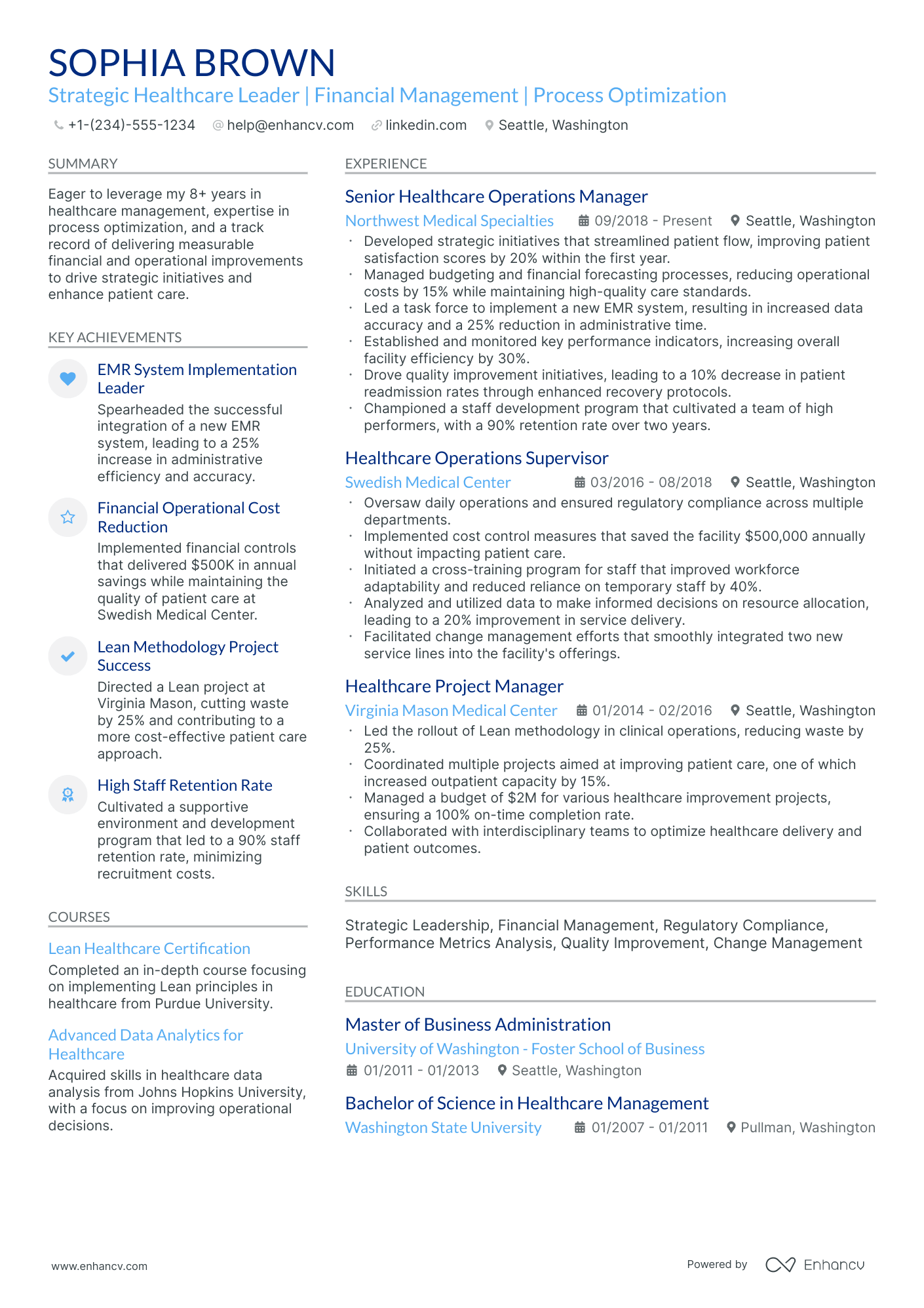As a healthcare operations manager, effectively conveying your diverse skill set on your resume to balance clinical knowledge and operations management can be particularly challenging. Our guide provides strategies to articulate this dual expertise clearly, ensuring that hiring managers recognize the full breadth of your capabilities.
- The most effective healthcare operations manager resume samples, reflecting on experience and skills.
- +10 simple, yet impactful methods to tailor your healthcare operations manager resume to the job advert.
- Using your professional achievements as the North Star to your unique value as a healthcare operations manager candidate.
- 'No one cares about your education nowadays …' Let's prove this statement wrong with the best-kept industry secrets to your education and certifications.
If the healthcare operations manager resume isn't the right one for you, take a look at other related guides we have:
- Director of Business Development Resume Example
- Technical Manager Resume Example
- Venue Manager Resume Example
- Commodity Manager Resume Example
- RPA Business Analyst Resume Example
- Construction General Manager Resume Example
- Demand Planning Manager Resume Example
- Practice Manager Resume Example
- Fitness General Manager Resume Example
- Compliance Manager Resume Example
Healthcare operations manager resume format made simple
You don't need to go over the top when it comes to creativity in your healthcare operations manager resume format .
What recruiters care about more is the legibility of your healthcare operations manager resume, alongside the relevancy of your application to the role.
That's why we're presenting you with four simple steps that could help your professional presentation check all the right boxes:
- The reverse-chronological resume format is the one for you, if you happen to have plenty of relevant (and recent) professional experience you'd like to showcase. This format follows a pretty succinct logic and puts the focus on your experience.
- Keep your header simple with your contact details; a headline that details the role you're applying for or your current job; and a link to your portfolio.
- Ensure your resume reaches an up-to-two-page limit, only if you happen to be applying for a more senior role or you have over a decade of relevant experience.
- Save your healthcare operations manager resume as a PDF to retain its structure and presentation.
Customize your resume for the market – a Canadian format, for example, might vary in structure.
Upload & Check Your Resume
Drop your resume here or choose a file. PDF & DOCX only. Max 2MB file size.
PRO TIP
List your educational qualifications and certifications in reverse chronological order.
Essential sections that should make up your healthcare operations manager resume include:
- The header - with your contact details (e.g. email and telephone number), link to your portfolio, and headline
- The summary (or objective) - to spotlight the peaks of your professional career, so far
- The experience section - with up to six bullets per role to detail specific outcomes
- The skills list - to provide a healthy mix between your personal and professional talents
- The education and certification - showing your most relevant degrees and certificates to the healthcare operations manager role
What recruiters want to see on your resume:
- Proven experience in healthcare operations, including clinic or hospital management and administrative leadership.
- Knowledge of healthcare regulations, accreditation standards, and compliance with state and federal laws.
- Strong financial management skills, including budgeting, financial analysis, and cost control specific to healthcare settings.
- Ability to improve patient care services through implementation of effective healthcare delivery systems and quality improvement initiatives.
- Proficiency in Electronic Health Records (EHR) systems and healthcare information technology to streamline operations.
Essential tips for crafting your healthcare operations manager resume experience section
The experience section is indeed the core of your healthcare operations manager resume. It's where you present your past and current job roles. But how should you approach this crucial part?
A common error is treating the experience section as merely a list of job duties. Many candidates fall into the trap of detailing what they did without illustrating the impact of their actions.
To effectively write your healthcare operations manager resume experience section, consider these guidelines:
- Emphasize your achievements, supported by concrete metrics such as percentages, revenue increases, or customer satisfaction rates;
- Avoid using generic buzzwords like communication, hard work, or leadership. Instead, demonstrate how these skills added value in your previous roles;
- Begin each bullet point with a strong action verb, followed by a skill, and then the result of your actions;
- Tailor your resume for each job application by selecting the most relevant experiences, responsibilities, and successes.
We have an array of resume examples that illustrate how to optimally curate your healthcare operations manager resume experience section.
- Led the operational streamlining of inpatient care processes at a 150-bed facility, increasing patient throughput by 20% within the first year.
- Negotiated with vendors to implement a new Electronic Health Records system, improving record accuracy and access for a team of 200 healthcare professionals.
- Directed cross-functional teams in a major quality improvement initiative that reduced medication errors by 25%, enhancing patient safety and care standards.
- Managed day-to-day healthcare operations, overseeing a staff of 120, to ensure compliance with federal and state regulations.
- Implemented a facility-wide cost control program that cut operational expenses by 18% without sacrificing the quality of patient care.
- Coordinated the expansion of outpatient services, leading to a 30% increase in outpatient volume and an enhanced community healthcare provision.
- Developed and executed a strategic plan to integrate multiple clinics under a centralized operations model, raising overall efficiency by 15%.
- Launched a telemedicine program that served over 5000 patients in its first year, reducing emergency room visits by 10%.
- Championed the use of data analytics to drive decision-making, resulting in a 35% increase in patient satisfaction scores.
- Orchestrated the merger of clinical and administrative departments, consolidating workflows and achieving a cost savings of $1.5 million annually.
- Piloted a workforce optimization initiative which bolstered staff productivity by 22% and reduced overtime by 15%.
- Collaborated with IT to enhance the patient portal, leading to a 40% increase in usage and improved patient engagement and satisfaction.
- Oversaw facility operations for a group of 10 primary care clinics, delivering care to over 75,000 patients annually.
- Spearheaded the development of a patient flow optimization tool that reduced wait times by 25% and increased clinician availability.
- Forged strategic partnerships with community organizations to deliver wellness programs, impacting 20,000 individuals with preventive health measures.
- Sculpted a culture of continuous improvement, applying Lean methodologies to remove inefficiencies in patient admission processes.
- Initiated partnership with technology startups to integrate AI diagnostic assistance into the workflow, enhancing diagnostic accuracy by 18% for critical illnesses.
- Served as the project lead for a multi-million dollar facility renovation, updating infrastructure to better cater to emergent healthcare trends and demands.
- Architected the reorganization of the patient services department to align with best practices, achieving a 95% patient satisfaction rating.
- Reduced inventory waste by implementing a new supply chain management system, achieving a 20% reduction in annual spending on medical supplies.
- Streamlined patient discharge procedures, reducing average discharge time by 45 minutes and subsequently increasing bed availability.
- Led the adoption of a centralized scheduling system across all departments, reducing scheduling errors by 30% and improving patient flow.
- Designed and rolled out staff development programs which lifted employee retention rates by 20%, fortifying institutional knowledge and expertise.
- Held responsibility for overhauling emergency response protocols, cutting response time by 15% and improving outcomes for critical care patients.
Quantifying impact on your resume
- Highlight cost-saving initiatives you've implemented, specifying the percentage or dollar amount saved annually.
- Detail revenue growth achieved through operational improvements or program expansions by providing exact figures or percentages.
- Show the size of teams you've managed by including the number of direct reports to stress leadership capabilities.
- Quantify improvements in patient satisfaction scores you contributed to, using specific percentage increases.
- Include numbers related to process efficiencies you instated, such as reduced patient wait times or increased throughput.
- Mention any large-scale projects you headed, including budget size, scope, and the financial or operational impact made.
- Indicate any compliance or accreditation standards you've met or exceeded, quantifying audit scores or compliance rates.
- Document the implementation of technology or systems improvements, including investment costs and the return on investment seen.
Action verbs for your healthcare operations manager resume
No relevant experience - what to feature instead
Suppose you're new to the job market or considering a switch in industry or niche. In such cases, it's common to have limited standard professional experience. However, this isn't a cause for concern. You can still craft an impressive healthcare operations manager resume by emphasizing other sections, showing why you're a great fit for the role:
- Emphasize your educational background and extracurricular activities to demonstrate your industry knowledge;
- Replace the typical experience section with internships or temporary jobs where you've gained relevant skills and expertise;
- Highlight your unique skill set, encompassing both technological and personal abilities;
- Showcase transferable skills acquired throughout your life and work experiences so far.
Recommended reads:
PRO TIP
If you failed to obtain one of the certificates, as listed in the requirements, but decide to include it on your resume, make sure to include a note somewhere that you have the "relevant training, but are planning to re-take the exams". Support this statement with the actual date you're planning to be re-examined. Always be honest on your resume.
Shining a light on your healthcare operations manager hard skills and soft skills
To win recruiters over, you must really have a breadth of skill set presented and supported within your healthcare operations manager resume.
On hiring managers' checklists, you'd initially discover hard or technical skills. Those are the technology (and software) that help you perform on the job. Hard skills are easy to quantify via your education, certificates, and on-the-job success.
Another main criterion recruiters are always assessing your healthcare operations manager resume on is soft skills. That is your ability to communicate, adapt, and grow in new environments. Soft skills are a bit harder to measure, as they are gained both thanks to your personal and professional experience.
Showcase you have the ideal skill set for the role by:
- Dedicating both a skills box (for your technical capabilities) and an achievements or strengths section (to detail your personal skills).
- When listing your skills, be specific about your hard skills (name the precise technology you're able to use) and soft skills (aim to always demonstrate what the outcomes were).
- Avoid listing overused cliches in the skills section (e.g. Microsoft Office and Communication), unless they're otherwise specified as prominent for the role.
- Select up to ten skills which should be defined via various sections in your resume skills sidebar (e.g. a technical skills box, industry expertise box with sliders, strengths section with bullets).
Spice up your resume with leading technical and people skills, that'd help you get noticed by recruiters.
Top skills for your healthcare operations manager resume:
Electronic Health Records (EHR) Systems
Healthcare Management Software
Data Analytics Tools
Budgeting and Financial Management Software
Project Management Software
Regulatory Compliance Tools
Patient Management Systems
Quality Improvement Tools
Supply Chain Management Software
Telemedicine Platforms
Leadership
Communication
Problem Solving
Time Management
Interpersonal Skills
Critical Thinking
Adaptability
Team Collaboration
Decision Making
Conflict Resolution
PRO TIP
The more time and effort you've put into obtaining the relevant certificate, the closer to the top it should be listed. This is especially important for more senior roles and if the company you're applying for is more forward-facing.
The basics of your healthcare operations manager resume certifications and education sections
Improve the education and certification sections of your healthcare operations manager resume by:
- Dedicating more prominent space to certificates that are more recent and have helped you update your skill set
- Keeping all the information you list to the basics: certificate/degree name, institution, and graduation dates
- Writing supplementary information in the details of your certification or education section, only if you lack experience or want to show further skill alignment
- Including your credential or license number, only if the information is valid to your application or certification
Within healthcare operations manager job adverts, relevant education, and certification are always listed within the key prerequisite for the role.
Ensure you meet all job requirements with some of the leading certificates in the industry:
The top 5 certifications for your healthcare operations manager resume:
- Certified Professional in Healthcare Management (CPHM) - American Academy of Medical Administrators (AAMA)
- Certified Medical Manager (CMM) - Professional Association of Health Care Office Management (PAHCOM)
- Certified Healthcare Facility Manager (CHFM) - American Hospital Association (AHA)
- Certified Professional in Healthcare Quality (CPHQ) - National Association for Healthcare Quality (NAHQ)
- Fellow of the American College of Healthcare Executives (FACHE) - American College of Healthcare Executives (ACHE)
PRO TIP
Listing your relevant degrees or certificates on your healthcare operations manager resume is a win-win situation. Not only does it hint at your technical capabilities in the industry, but an array of soft skills, like perseverance, adaptability, and motivation.
Recommended reads:
Writing the healthcare operations manager resume summary or objective: achievements, keywords, dreams, and more
Deciding on whether to include a resume summary or resume objective should entirely depend on your career situation.
If you have:
- Plenty of relevant achievements you'd like to bring recruiters' focus to, make use of the resume summary. Ensure each of your achievements is quantified with concrete proof (e.g. % of cases solved).
- Less applicable experience, utilize the resume objective. Within the objective include a few noteworthy, past successes, followed up by your professional dreams.
As a bonus, you could define in either your healthcare operations manager resume summary or objective what makes you the perfect candidate for the role.
Think about your unique hard and soft skills that would make your expertise even more important to the job.
These healthcare operations manager professionals have completely covered the formula for the ideal resume introduction:
Resume summaries for a healthcare operations manager job
- Seasoned healthcare operations manager with over 12 years of experience leading hospital administration with a focus on improving patient outcomes and streamlining medical services. Adept in directing cross-functional teams and implementing cost reduction strategies; achieved a 20% cut in overhead costs without compromising quality of care.
- Dynamic former Supply Chain Director with 15 years in logistics management, strategically pivoting to healthcare operations management. Proven skills in process improvement and cost management, eager to transfer this knowledge to increase efficiencies within a patient-first health service framework.
- Driven Financial Analyst with an MBA and 7 years of experience in the pharmaceutical industry, seeking to transfer my robust analytical and budget management skills to a career as a healthcare operations manager to optimize resource allocation and enhance the delivery of care services.
- Accomplished healthcare professional with 10 years of nursing experience, transitioning to Healthcare Operations Management to leverage hands-on patient care insights. Skilled in team leadership and workflow optimization, I have successfully implemented a hospital-wide EHR system, resulting in a 30% increase in operational efficiency.
- Objective: To harness my enthusiasm for community health improvement and my aptitude for strategic planning in an entry-level healthcare operations manager position, bringing a fresh perspective and unwavering commitment to excellence in patient care and service effectiveness.
- Objective: Aspiring healthcare operations manager with a Master's in Health Administration, aiming to leverage my academic background and volunteer experience in health services to champion operational excellence and support a medical facility's commitment to quality care and patient satisfaction.
Optimize your resume summary and objective for ATS
Drop your resume here or choose a file.
PDF & DOCX only. Max 2MB file size.
Other relevant sections for your healthcare operations manager resume
Apart from the standard healthcare operations manager resume sections listed in this guide, you have the opportunity to get creative with building your profile. Select additional resume sections that you deem align with the role, department, or company culture. Good choices for your healthcare operations manager resume include:
- Language skills - always ensure that you have qualified each language you speak according to relevant frameworks;
- Hobbies - you could share more about your favorite books, how you spend your time, etc. ;
- Volunteering - to highlight the causes you care about;
- Awards - for your most prominent healthcare operations manager professional accolades and achievements.
Make sure that these sections don't take too much away from your experience, but instead build up your healthcare operations manager professional profile.
Key takeaways
Securing your ideal job starts with crafting a compelling healthcare operations manager resume. It should not only highlight your professional strengths but also reflect your personality. Key aspects to remember include:
- Choose a clear, easily editable format, allowing more time to focus on the content of your resume;
- Emphasize experience relevant to the job, focusing on your impact on the team;
- Opt for a resume summary if you have extensive professional experience, and a resume objective if you're just starting out;
- Include technical skills in the skills section and interpersonal skills in the achievements section;
- Recognize the importance of various resume sections (e.g., My Time, Projects) in showcasing both your professional abilities and personal traits.
